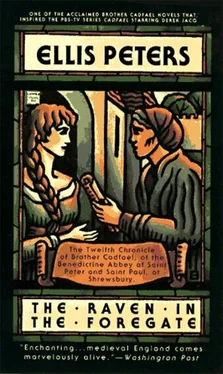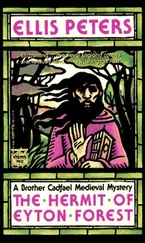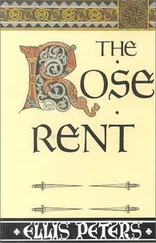Brother Cadfael intercepted a startled and solemn Benet at the edge of the dispersing crowd. The boy had a distracted look about him, between mild guilt and deep bewilderment. He jutted a dubious underlip at Cadfael, and shook his head vehemently, as if to shake off some clinging illusion that made no sense, and yet would not be ignored.
“You won’t need me today. I’d best go with them.”
“No,” said Cadfael decidedly. “You stay here and look after Mistress Hammet. Take her home if she’ll go, or find her a warm corner in the gatehouse and stay with her. I know where I met with the priest, and I’ll see the hunt started. If anyone wants me, you can answer for me that I’ll be back as soon as may be.”
“But you’ve been up the better part of the night,” protested Benet, hesitating.
“And you?” said Cadfael, and made off towards the gatehouse before Benet could reply.
Ailnoth had passed by in the evening like a black arrow from a war-bow, so blind, so deaf that he had neither seen Brother Cadfael nor heard his greeting, called clearly into a brazen frost that rang like bells. At that point in the Foregate he could have been making for the bridge, in which case his urgent business was with someone in the town itself, or for any of the paths which diverged from the Foregate beyond this point. Of these there were four, one to the right, down into the riverside level of the Gaye, where the abbey’s main gardens spread for almost half a mile in plots, fields and orchards, and gave place at last to woodland, and a few scattered homesteads; three to the left, a first path turning in on the near side of the mill-pond, to serve the mill and the three small houses fringing the water there, the second performing the same function for the three on the opposite side. Each of these paths was prolonged alongside the water, but to end blindly at the obstacle of the Meole Brook. The third was the narrow but well-used road that turned left just short of the Severn bridge, crossed the Meole Brook by a wooden foot-bridge where it emptied into the river, and continued south-west into woodland country leading towards the Welsh border.
And why should Father Ailnoth be hurtling like the wrath of God towards any one of these paths? The town had seemed a likelier aim, but others were taking care of enquiries there, whether the watch at the gate had seen him, whether he had stopped to enquire for anyone, whether a black, menacing shadow had passed by under the gatehouse torches. Cadfael turned his attention to the more devious ways, and halted to consider, on the very spot, so far as he could judge, where Ailnoth had passed him by.
The Foregate parish of Holy Cross embraced both sides of the road, on the right stretching well into the scattered hamlets beyond the suburb, on the left as far as the brook. Had Ailnoth been bent upon visiting someone in a country croft, he would have started directly eastward from his house in the alley opposite the abbey gatehouse, and never entered the Foregate highway at all, unless his goal was one of the few dwellings beyond the Gaye. Small ground to cover there. Cadfael deployed two parties in that direction, and turned his attention towards the west. Three paths here, one that became a regular road and would take time, two that were near, short and could surely be cleared up with little delay. And in any case, what would Ailnoth be doing at that late hour, setting out on a longer journey? No, he was on his way to some place or person close by, for what purpose only he knew.
The path on the near side of the mill-pond left the road as a decent cart track, since it had to carry the local corn to the mill, and bring the flour homeward again. It passed by the three small houses that crowded close to the highway, between their doors and the boundary wall of the abbey, reached the small plateau by the mill, where a wooden bridge crossed the head-race, and thence wandered on as a mere footpath in rough meadow grass by the edge of the water, where several pollarded willows leaned crookedly from the high bank. The first and second cottages were occupied by elderly people who had purchased bed and board for life by the grant of their own property to the abbey. The third belonged to the miller, who had been in the church throughout the night offices, to Cadfael’s knowledge, and was here among the searchers now in mid morning. A devout man, as well as sedulous in preserving the favour he enjoyed with the Benedictines, and the security of his employment.
“Not a soul did I see along the waterside,” said the miller, shaking his head, “when I came out last night to go to church, and that must have been much the same time as Brother Cadfael met with Father Ailnoth on the road. But I went straight through the wicket into the great court, not along the track, so he could have been bound this way only a matter of minutes later, for all I know. The old dame in the house next mine is house-bound once the frosts begin, she’d be home.”
“And deaf as a stone,” said Brother Ambrose flatly. “Any man who called for help outside her door, no matter how loudly, would call in vain.”
“I meant, rather,” said the miller,”that Father Ailnoth may have set out to visit her, knowing she dared not stir out even as far as the church. It’s his duty to visit the aged and infirm, for their comfort…”
The face Cadfael had glimpsed in the frosty night, flaring and fading as it surged past the torches, had not looked to him as if its errand was one of comfort, but he did not say so. Even the miller, charitably advancing the possibility, had sounded dubious.
“But even if he did not,” he said, rallying stoutly,”the maidservant who looks after the old dame has sharp enough ears, and may have heard or seen him if he did pass this way.”
They separated into two parties, to comb the paths on either side the water, Brother Ambrose taking the far side, where it was but a narrow, beaten footpath serving the three little houses and continuing along the waterside under their sloping gardens, Cadfael the cart track that led to the mill, and there dwindled into a footpath in its turn. On both the white sheen of frost was dimpled and darkened by a few footprints, but those belonged all to the morning. The rime had silvered and concealed any that might have been made by night.
The elderly couple living retired in the first house had not been out of their door since the previous day, and had heard nothing of the priest being missing. Such sensational news had them gaping in an excitement partly pleasurable, and set their tongues wagging in exclamation and lamentation, but elicited no information at all. They had shuttered their window and barred their door early, made up a steady fire, and slept undisturbed. The man, once a forester in the abbey’s portion of the forest of Eyton, went in haste to pull on his boots and wrap himself in a sacking cape, and join the hunt.
At the second house the door was opened to them by a pretty slattern of about eighteen, with a mane of dark hair and bold, inquisitive eyes. The tenant was merely a high, querulous voice from the inner room, demanding why the door stood open to let in the cold. The girl whisked away for a moment to reassure her, speaking in a loud screech and perhaps with much gesture, for the complaint sank to a satisfied mumble. The girl came back to them, swathing a shawl about her and closing the door behind her to forestall further complaint.
“No,” she said, shaking her dark mane vigorously, “not a soul that I know of came along here in the night, why should they? Never a sound did I hear after dark, and she was in her bed as soon as the daylight went, and she’d sleep through the trump of doom. But I was awake until later, and there was nothing to hear or see.”
They left her standing on the doorstone, curious and eager, gazing after them along the track as they passed the third house and came to the tall bulk of the mill. Here, with no houses in between, the still surface of the mill-pond opened on their right hand, dull silver, widening and shallowing into a round pool towards the road from which they had come, tapering gradually before them into the stream that carried the water back to the Meole Brook and the river. Rimy grass overhung the high bank, undercut here by the strength of the tail-race. And still no sign of any black form anywhere in the wintry pallor. The frost had done no more than form a thin frill of ice in the shallows, where the reed beds thickened and helped to hold it. The track reached the mill and became a narrow path, winding between the steep-roofed building and the precinct wall, and crossing the head-race by a little wooden bridge with a single hand-rail. The wheel was still, the sluice above it closed, and the overflow discharging its steady stream aside into the tail-race deep below, and so out into the pool, a silent force perceptible only as a shudder along the surface, which otherwise lay so still.
Читать дальше












